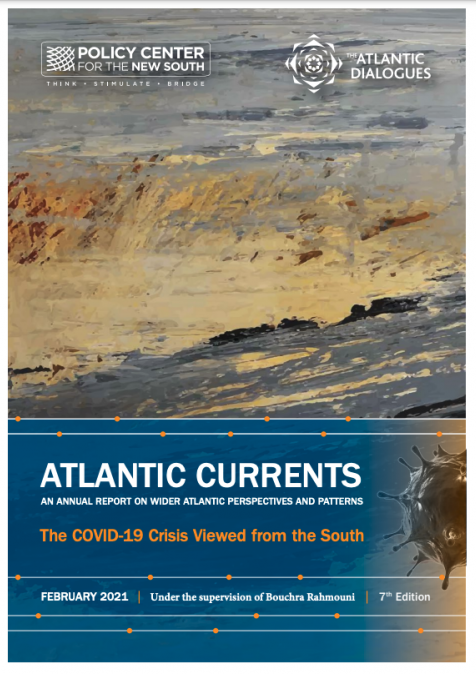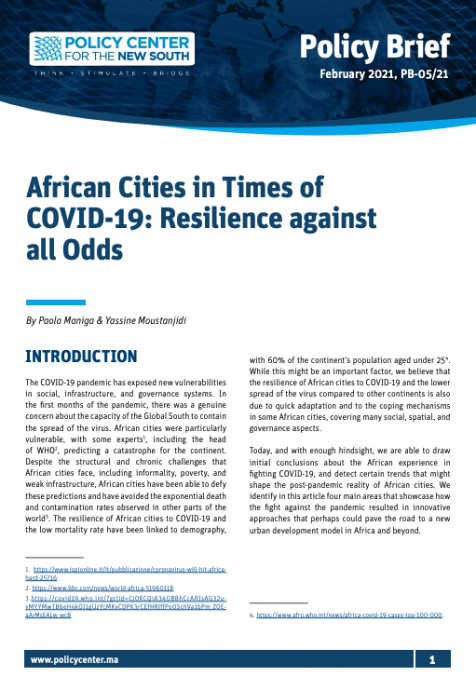Publications /
Opinion
There is not much of an argument: some countries in mighty Africa faced and mastered the COVID-19 invasion as efficiently, or even better, than any nation on the globe, including former colonial powers in Europe. By June 2021, 140,400 Africans had died, compared to more than 500,000 virus victims in Brazil, or 600,000 plus in the U.S. Some experts explain the result as a product of long experience from a multitude of previous health crises: Ebola, AIDS/HIV, malaria, tuberculosis. Others mentioned the youth of Africa, pointing to giant Nigeria, with a median population age of 18. And only 2% of Africa’s population of 1.3 billion is aged above 70, whereas in many Western societies, the older population has been the most devastated by the pandemic. Nigeria, with a population of 211 million, reported to date only 2124 COVID-19 victims. Its capitol, Lagos, about 15 million inhabitants, reported only 220 COVID-19 deaths.
It seems encouraging yet too perfect to be true. Uganda reported 781 deaths, Somalia 775, Rwanda 402, Mali 525—miracles under the African sun, finally? Or is there another explanation? Ten African countries account for 80% of Africa’s COVID-19 testing, suggesting differences in testing capacities. How many nations underreport or do not report? By July of this year, Nigeria had fully vaccinated only 0.7% of its people. Optimists argue that Africa’s almost immediate reaction to the menace avoided an even worse catastrophe: At least 40 nations implemented their highest level of restrictions before they saw their tenth death. Egypt introduced curfews, the closure of international borders, and strict bans on gatherings, only weeks after the first positive cases were detected (on February 14, 2020). Lesotho imposed a national lockdown, before any positive COVID-19 case was detected.
Salma Daoudi, Researcher in International Relations at the Policy Center for the New South, did not follow the triumphant waterfall of words, praising the glorious African resistance against COVID-19, but published a sober, even alarming, report (‘COVID-19: A Perfect Storm of African Insecurities’). In the Annual Report on Africa’s Geopolitics, Daoudi admits that the fragile and vulnerable African health systems were expected to crumble under the pressure of COVID-19 cases, laying bare decades of public health underfunding: “However, these fears, which often perceived and portrayed the African continent as a monolithic and homogeneous bloc have proved unfounded. Most African countries have managed to swiftly impose severe lockdowns and social distancing measures and thus avoid inflationary death and infection rates”. Nevertheless, the virus, Daoudi confirmed, has “threatened the stability of states by compounding individual and societal insecurities”.
Even more tragic: “As an economic wrecking ball, eroding the social fabric of societies, and carrying profound intergenerational consequences, the pandemic has exacerbated both individual and state level vulnerabilities, deepening inequalities between and within countries”. And: “The COVID-19 pandemic has exposed the violence of social inequality and the extent to which social determinants of health are directly intertwined with insecurities”. Daoudi wrote that “given the impact of COVID-19 on African growth trajectories, the pandemic is indeed reversing decades of progress in poverty reduction, the promotion of education, health improvements and overall wellbeing”. The United Nations Economic Commission for Africa (UNECA) estimated that between 5 million and 29 million Africans may be pushed below the extreme poverty line by the disease’s repercussions. Failure to contain the pandemic in 2021 might bring an additional 59 million to the brink of extreme poverty, UNECA indicated, thereby inflating the total number of Africans living in extreme poverty to over 514 million.
An Inability to Shield the Most Vulnerable
“Africa’s disproportionate reliance on world markets, from which it imports over 85% of its food, has proven to be detrimental to the continent’s food security” Daoudi noted. “The pandemic has profoundly disturbed trade, production, and value chains, which has led to both, panic buying and price gauging”. Daoudi argued: “The precariousness of several African economies was translated into an inability to shield the most vulnerable populations from the direct and indirect costs of the pandemic. Indirect costs include substantial job and income losses, especially in the most dynamic sectors such as tourism and commodity trade. This has caused unemployment and inactivity to increase dramatically, with the International Labor Organization (ILO) estimating that working hours in Africa declined by about 7.7% over 2020 and could lead to the loss of 19 million jobs”.
The ILO estimates that informal employment in Africa accounts for 85.8% of all employment, contributing between 30% and 65% to GDP. Most informal workers lack social protection or access to quality health care. Salma Daoudi predicted the probable outcome: “Given the low and unreliable incomes for most informal sector workers, the COVID-19 shock is generating severe livelihood losses, pushing more people into extreme poverty”. The health insecurity, which has become almost chronic, wrote the Policy Center expert, “is in itself a form structural violence, depriving individuals of opportunities for social and economic mobility”.
“COVID-19 emerged against a backdrop of pre-existing communicable and non-communicable diseases, which were already weighing on African health systems and their ability to provide adequate care” noted Daoudi. Diseases such as lower respiratory infections, HIV/AIDS, malaria, meningitis, and tuberculosis, constitute the main mortality drivers in the region. Such infectious diseases account for an annual productivity loss of over 800 billion dollars for the African continent, severely hindering its development, declared a 2019 World Health Organization document[1]. Tuberculosis and HIV/Aids programs may be disrupted or face significant budget cuts, warns the WHO, predicting that the disruption of malaria-control programs could double the number of malaria deaths in sub-Saharan Africa. The disease caused over 228 million cases of infection, and 409,000 deaths in 2018. Salma Daoudi concluded: “The first and most direct impact of the pandemic has undeniably been on individual health security. Fear and anguish have permeated and shaped lived experiences of the pandemic, which has both a debilitating as well as lethal effect on populations”. The rapid spread of COVID-19 has also threatened the accessibility and availability of health services for patients suffering from other health conditions. The financial drain the pandemic represents is diverting political and financial attention from particularly pressing African health priorities. “In countries where there are pre-existing underlying tensions, the pandemic has intensified and increased risks of instability by reviving social grievances and creating new flashpoints for tension. Given constrained financial capacities, most African states have had to divert financial resources from other key sectors, necessary to promote further development, which is likely to undermine years of progress”. Salma Daoudi warned: “The resulting radicalization of grievances and tensions could, in the right set of circumstances, ignite social unrest”.
The opinions expressed in this article belong to the author.
[1] WHO (2019). A Heavy Burden: The Productivity Cost of Illness in Africa.




